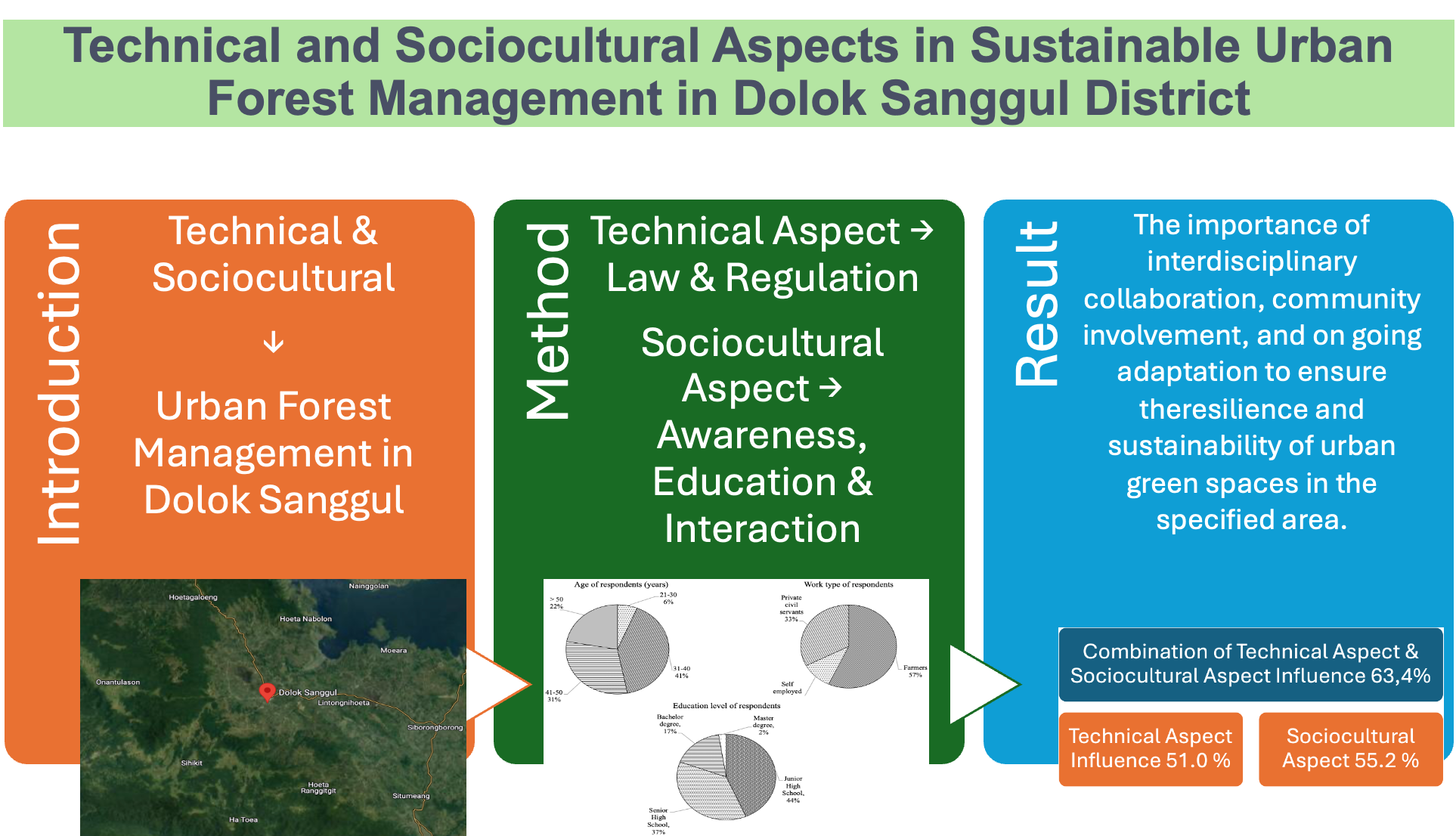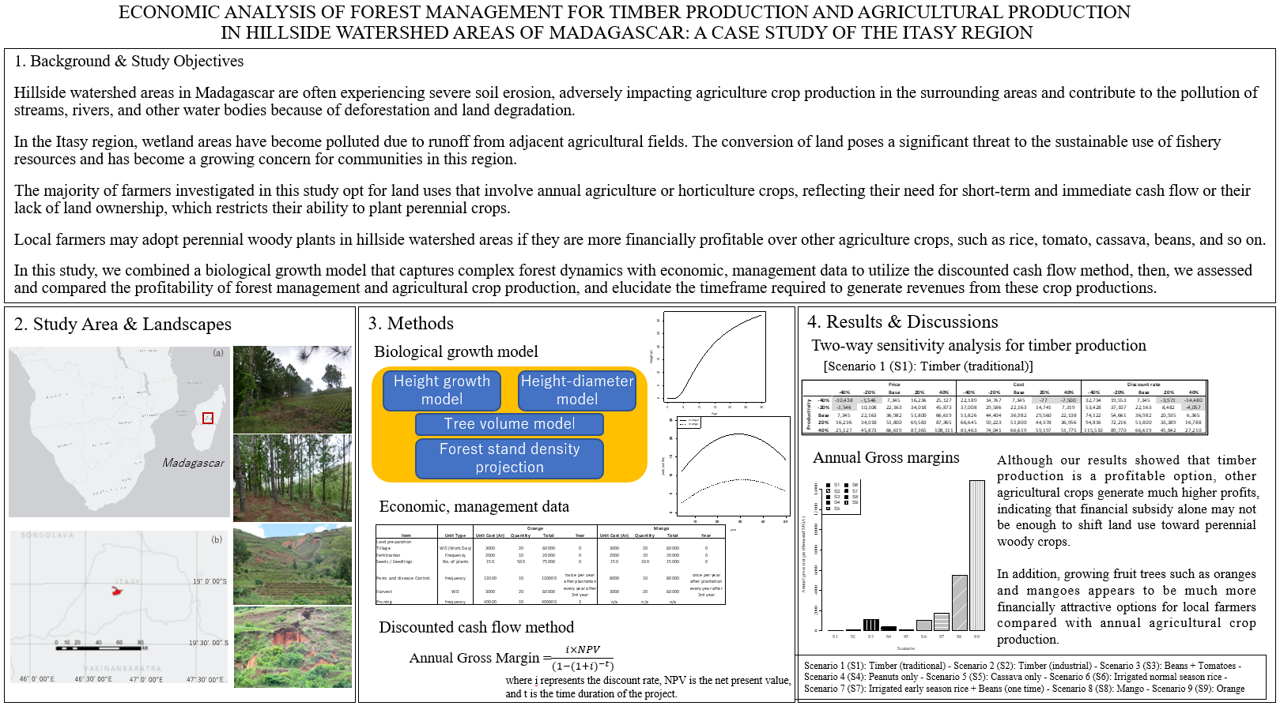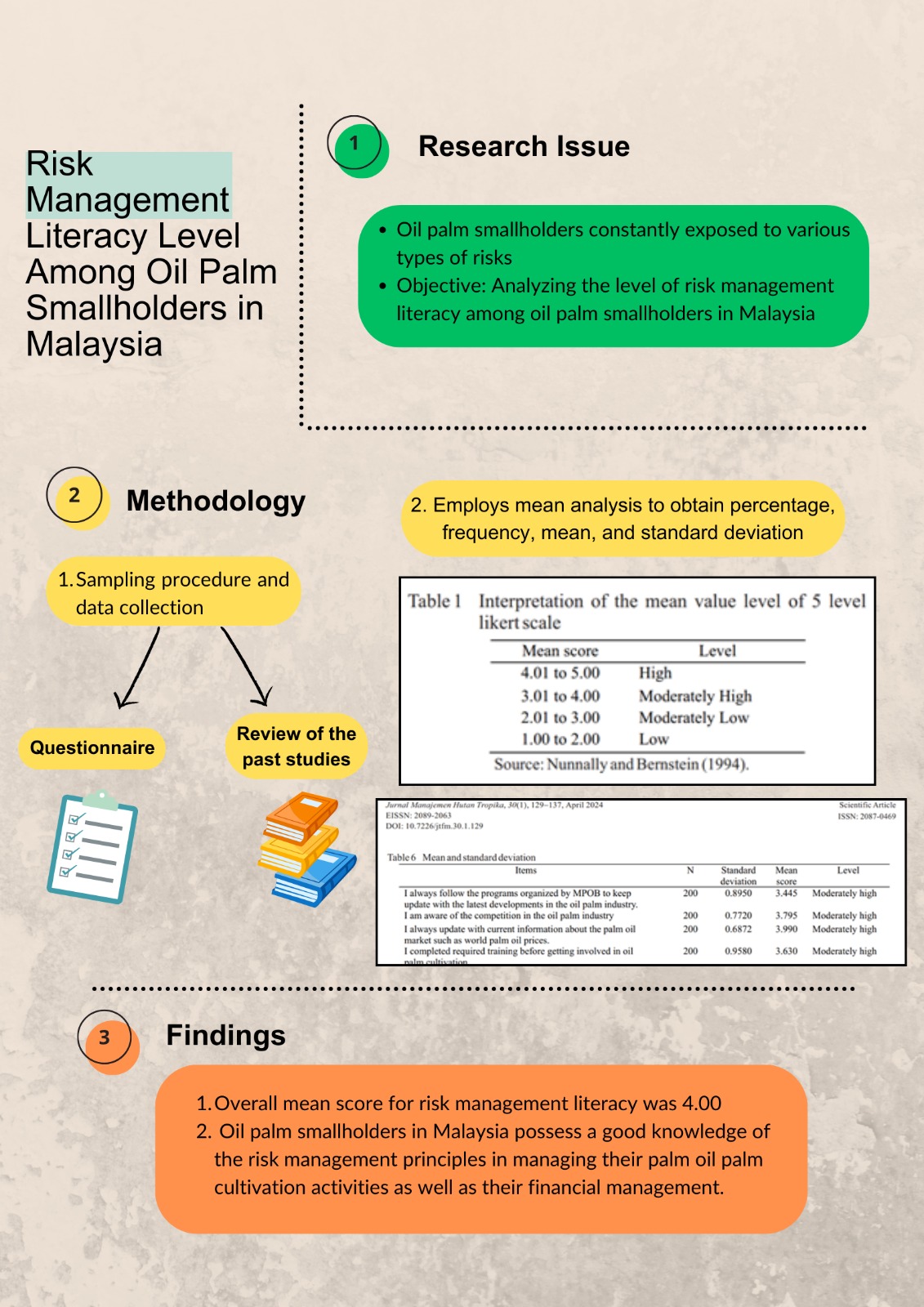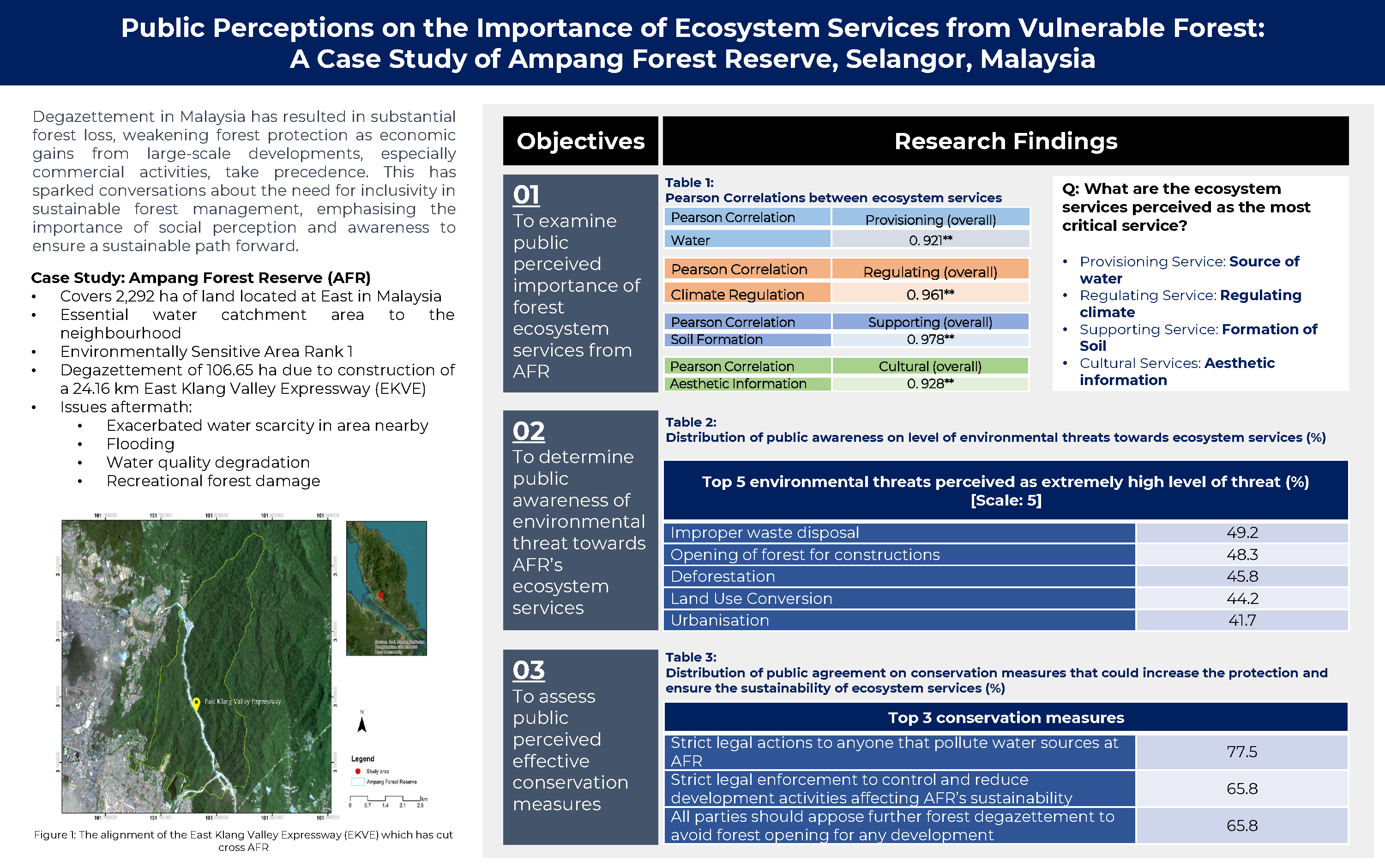Technical and Sociocultural Aspects in Sustainable Urban Forest Management in Dolok Sanggul District
Abstract
Urban forest management is crucial for urban development, significantly contributing to environmental, economic, and social well-being. Dolok Sanggul District, in Humbang Hasundutan Regency, offers a unique context for examining technical and sociocultural aspects of urban forest management. This research aims to analyze these aspects' influence on urban forest management in Dolok Sanggul District using a quantitative research method and multiple regression analysis. The study's results indicate that both technical and sociocultural aspects significantly impact urban forest management. Technical aspects, such as law and regulation regarding forestry, account for 51.0% of the influence. Sociocultural aspects, including community opinions on community awareness and participation, education and the social environment, as well as community interaction, contribute 55.2%. Combined, these aspects exert a synergistic effect, with a total influence of 63.4% on urban forest management. These findings underscore the importance of integrating technical and sociocultural considerations to develop effective urban forest management strategies. By leveraging the strengths of both aspects, policymakers and urban planners can create sustainable and resilient urban forests that benefit the community and environment. Additionally, this research highlights the need for a holistic approach that values community input and technical expertise, ensuring balanced and sustainable urban development. This study provides a foundation for future research and practical applications, emphasizing the critical role of comprehensive planning and community engagement in urban forest management.
References
Abate, T. W., Zeleke, B., Genanew, A., & Abate, B. W. (2021) The burden of stroke and modifiable risk factors in Ethiopia: A systemic review and meta-analysis. PLOS ONE, 16(11), e0259244. https://doi.org/10.1371/journal.pone.0259244
Alikhani, S., Nummi, P., & Ojala, A. (2021). Urban wetlands: A review on ecological and cultural values. Water, 13(22), 3301. https://doi.org/10.3390/w13223301
Arikunto, A. (2005). Metode penelitian kuantitatif. Jakarta: Sagung Seto.
Athiah, A. (2022). The influence of work behavior, achievement motivation, and work competence on employee’s performance: A newest evidence. Enrichment: Journal of Management, 12(2), 1463–1472.
Barona, C. O., Eleuterio, A. A., Vasquez, A., Devisscher, T., Baptista, M. D., Dobbs, C., Orozco-Aguilar, L., & Meléndez-Ackerman, E. (2023). Views of government and non-government actors on urban forest management and governance in ten Latin-American capital cities. Land Use Policy, 129, 106635. https://doi.org/10.1016/j.landusepol.2023.106635
Boedhihartono, A. K. (2017). Can community forests be compatible with biodiversity conservation in Indonesia? Land, 6, 21. https://doi.org/10.3390/land6010021
Bueno, A. d. F., Sutil, W. P., Jahnke, S. M., Carvalho, G. A., Cingolani, M. F., Colmenarez, Y. C., & Corniani, N. (2023). Biological control as part of the soybean integrated pest management (IPM): Potential and challenges. Agronomy, 13, 2532. https://doi.org/10.3390/agronomy13102532
Chicco, D., Warrens, M. J., & Jurman, G. (2021). The coefficient of determination R-squared is more informative than SMAPE, MAE, MAPE, MSE and RMSE in regression analysis evaluation. PeerJ Computer Science, 7, e623. https://doi.org/10.7717/peerj-cs.623
Czaja, M., Kołton, A., & Muras, P. (2020). The complex issue of urban trees - stress factor accumulation and ecological service possibilities. Forests, 11(9), 932. https://doi.org/10.3390/f11090932
Disman, D., Ali, M., & Barliana, M. S. (2017). The use of quantitative research method and statistical data analysis in dissertation: An evaluation study. International Journal of Education, 10(1), 46–52. https://doi.org/10.17509/ije.v10i1.5566
du Toit, M. J., Cilliers, S. S., Dallimer, M., Goddard, M., Guenat, S., & Cornelius, S. F. (2018). Urban green infrastructure and ecosystem services in Sub-saharan Africa. Landscape and Urban Planning, 180, 249–261. https://doi.org/10.1016/j.landurbplan.2018.06.001
Erbaugh, J. T. (2019). Responsibilization and social forestry in Indonesia. Forest Policy and Economics, 109, 102019. https://doi.org/10.1016/j.forpol.2019.102019
Eriksen, S., Schipper, E. L. F., Scoville-Simonds, M., Vincent, K., Adam, H. N., Brooks, N., Harding, B., Khatri, D., Lenaerts, L., Liverman, D., Mills-Novoa, M., Mosberg, M., Movik, S., Muok, B., Nightingale, A., Ojha, H., Sygna, L., Taylor, M., Vogel, C., & West, J. J. (2021). Adaptation interventions and their effect on vulnerability in developing countries: Help, hindrance or irrelevance? World Development, 141(4), 105383. https://doi.org/10.1016/j.worlddev.2020.105383
Fiel’ardh, K., Fardhani, I., & Fujii, H. (2023). Integrating perspectives from education for sustainable development to foster plant awareness among trainee science teachers: A mixed methods study. Sustainability, 15(9), 7395. https://doi.org/10.3390/su15097395
Gallego-Valadés, A., Ródenas-Rigla, F., Garcés-Ferrer, J. (2020). Approach to urban environmental justice using exploratory spatial data analysis. The case of Valencia’s monumental trees. Sustainability, 12(18), 7760. https://doi.org/10.3390/su12187760
Gunawan, H., Yeny, I., Karlina, E., Suharti, S., Murniati, M., Subarudi, S., Mulyanto, B., Ekawati, S., Garsetiasih, R., Pratiwi, P., Sumirat, B. K., Sawitri, R., Heriyanto, N. M., Takandjandji, M., Widarti , A., Surati, S., Desmiwati, D., Kalima, T., Effendi, R., Martin, E., Ulya, N. A., Sylviani, S., & Nurlia, A. (2022). Forests, 13(12), 2152. https://doi.org/10.3390/f13122152
Heymans, A., Breadsell, J., Morrison, G. M., Byrne, J. J., & Eon, C. (2019). Ecological urban planning and design: A systematic literature review. Sustainability, 11(13), 3723. https://doi.org/10.3390/su11133723
Indrajaya, Y., Yuwati, T. W., Lestari, S., Winarno, B., Narendra, B. H., Nugroho, H. Y. S. H., Rachmanadi, D., Pratiwi, P., Turjaman, M., Adi, R. N., Savitri, E., Putra, P. B., Santosa, P. B., Nugroho, N. P., Cahyono, S. A., Wahyuningtyas, R. S., Prayudyaningsih, R., Halwany, W., Siarudin, M., Widiyanto, A., Utomo, M. M. B., Sumardi, S., Winara, A., Wahyuni, T., & Mendham, D. (2022). Tropical forest landscape restoration in Indonesia: A review. Land, 11(3), 328. https://doi.org/10.3390/land11030328
Jiménez, A., Saikia, P., Giné, R., Avello, P., Leten, J., Lymer, B. L., Schneider, K., & Ward, R. (2020). Unpacking water governance: A framework for practitioners. Water, 12(3), 827. https://doi.org/10.3390/w12030827
Julsrud, T. E. (2023). Sustainable sharing in local communities: Exploring the role of social capital. Local Environment, 26(6), 811–827. https://doi.org/10.1080/13549839.2023.2179611
Kaplan, H., Prahalad, V. & Kendal, D. (2023). From conservation to connection: Exploring the role of nativeness in shaping people’s relationships with urban trees. Environmental Management, 72, 10061018. https://doi.org/10.1007/s00267-023-01856-3
Kenessary, D., Kenessary, A., Adilgireiuly, Z., Akzholova, N., Erzhanova, A., Dosmukhametov, A., Syzdykov, D., Masoud, A. R., & Saliev, T. (2019). Air pollution in Kazakhstan and its health risk assessment. Annals of Global Health, 85(1), 133. https://doi.org/10.5334/aogh.2535
Khair, N. K. M., Lee, K. E., & Mokhtar, M. (2020). Sustainable city and community empowerment through the implementation of community-based monitoring: A conceptual approach. Sustainability, 12(22), 9583. https://doi.org/10.3390/su12229583
Klobucar, B., Östberg, J., Jansson, M., & Randrup, T. B. (2020). Long-term validation and governance role in contemporary urban tree monitoring: A review. Sustainability, 12(14), 5589. https://doi.org/10.3390/su12145589
Kowarik, I., Hiller, A., Planchuelo, G., Seitz, B., von der Lippe, M., & Buchholz, S. (2019). Emerging urban forests: Opportunities for promoting the wild side of the urban green infrastructure. Sustainability, 11(22), 6318. https://doi.org/10.3390/su11226318
Kumar, R., Verma, A., Shome, A., Sinha, R., Sinha, S., Jha, P. K., Kumar, R., Kumar, P., Shubham, S., Das, S., Sharma, P., & Prasad, P. V. V. (2021). Impacts of plastic pollution on ecosystem services, sustainable development goals, and need to focus on circular economy and policy interventions. Sustainability, 13(17), 9963. https://doi.org/10.3390/su13179963
Lempiälä, T., Apajalahti, E. L., Haukkala, T., & Lovio, R. (2019). Socio-cultural framing during the emergence of a technological field: Creating cultural resonance for solar technology. Research Policy, 48(9), 103830. https://doi.org/10.1016/j.respol.2019.103830
Liang, D., & Huang, G. (2023). Influence of urban tree traits on their ecosystem services: A literature review. Land, 12(9), 1699. https://doi.org/10.3390/land12091699
Manisalidis, I., Stavropoulou, E., Stavropoulos, A., & Bezirtzoglou, E. (2020). Environmental and health impacts of air pollution: A review. Frontiers in Public Health, 8, 00014. https://doi.org/10.3389/fpubh.2020.00014
Mariyam, S., Satria, A. P., & Samsudin, M. (2023). What are the forms and obstacles of community participation in environmental damage prevention? Administrative and Environmental Law Review, 4(2), 115–126. https://doi.org/10.25041/aelr.v4i2.2992
Maruna, M., Crnčević, T., & Milojević, M. P. (2019). The institutional structure of land use planning for urban forest protection in the post-socialist transition environment: Serbian experiences. Forests, 10(7), 560. https://doi.org/10.3390/f10070560
Mauree, D., Naboni, E., Coccolo, S., Perera, A. T. D., Nik, V. M., & Scartezzini, J. L. (2019). A review of assessment methods for the urban environment and its energy sustainability to guarantee climate adaptation of future cities. Renewable and Sustainable Energy Reviews, 112, 733–746. https://doi.org/10.1016/j.rser.2019.06.005
Méndez-Picazo, M. T., Galindo-Martín M. A., & Castaño-Martínez, M. S. (2021). Effects of sociocultural and economic factors on social entrepreneurship and sustainable development. Journal of Innovation & Knowledge, 6(2). 69–77. https://doi.org/10.1016/j.jik.2020.06.001
Mensah, J. (2019). Sustainable development: Meaning, history, principles, pillars, and implications for human action: Literature review. Cogent Social Sciences, 5(1), 1653531. https://doi.org/10.1080/23311886.2019.1653531
Moldavska, A., & Welo, T. (2019). A holistic approach to corporate sustainability assessment: Incorporating sustainable development goals into sustainable manufacturing performance evaluation. Journal of Manufacturing Systems, 50, 53–68. https://doi.org/10.1016/j.jmsy.2018.11.004
Mrak, I., Ambruš, D., & Marović, I. (2022). A holistic approach to strategic sustainable development of urban voids as historic urban landscapes from the perspective of urban resilience. Buildings, 12(11), 1852. https://doi.org/10.3390/buildings12111852
Nawar, N., Sorker, R., Chowdhury, F. J., & Rahman, M. M. (2022). Present status and historical changes of urban green space in Dhaka City, Bangladesh: A remote sensing driven approach. Environmental Challenges, 6, 100425. https://doi.org/10.1016/j.envc.2021.100425
Nnaji, C. C., Chibueze, C., & Afangideh, C. B. (2023). The menace and mitigation of air pollution in the built environment: A review. Nigerian Journal of Technology, 42(1), 12–29. https://doi.org/10.4314/njt.v42i1.3
Nunes, L. J. R., Meireles, C. I. R., Gomes, C. J. P., & Ribeiro, N. M. C. A. (2020). Forest contribution to climate change mitigation: Management oriented to carbon capture and storage. Climate, 8(2), 21. https://doi.org/10.3390/cli8020021
Nyengere, J., Okamoto, Y., Funakawa, S., & Shinjo, H. (2023). Analysis of spatial heterogeneity of soil physicochemical properties in northern Malawi. Geoderma Regional, 25, e00733. https://doi.org/10.1016/j.geodrs.2023.e00733
Palomo, I., Locatelli, B., Otero, I., Colloff, M., Crouzat, E., Cuni-Sanchez, A., Gómez-Baggethun, E., González-García, A., Grêt-Regamey, A., Jiménez-Aceituno, A., Martín-López, B., Pascual, U., Zafra-Calvo, N., Bruley, E., Fischborn, M., Metz, R., Lavorel, S. (2021). Assessing nature-based solutions for transformative change. One Earth, 4(5), 730–741. https://doi.org/10.1016/j.oneear.2021.04.013
Pasaribu, S. I., Vanclay, F., & Zhao, Y. (2020). Challenges to implementing socially-sustainable community development in oil palm and forestry operations in Indonesia. Land, 9(3), 61. https://doi.org/10.3390/land9030061
Puplampu, D. A., & Boafo, Y. A. (2021). Exploring the impacts of urban expansion on green spaces availability and delivery of ecosystem services in the Accra metropolis. Environmental Challenges, 5, 100283. https://doi.org/10.1016/j.envc.2021.100283
Roman, L. A., Conway, T. M., Eisenman, T. S., Koeser, A. K., Barona, C. O., Locke, D. H., Jenerette, G. D., Östberg, J., & Vogt, J. (2020). Beyond ‘trees are Good’: Disservices, management costs, and tradeoffs in urban forestry. Ambio, 50(3), 615–630. https://doi.org/10.1007/s13280-020-01396-8
Semeraro, T., Scarano, A., Buccolieri, R., Santino, A., & Aarrevaara, E. (2021). Planning of urban green spaces: An ecological perspective on human benefits. Land, 10(2), 105. https://doi.org/10.3390/land10020105
Shayan, N. F., Mohabbati-Kalejahi, N., Alavi, S., & Zahed, M. A. (2022). Sustainable development goals (SDGs) as a framework for corporate social responsibility (CSR). Sustainability, 14(3), 1222. https://doi.org/10.3390/su14031222
Sigalingging, L. A. (2019). The history of Doloksanggul and its development as the capital of Humbang Hasundutan Regency (2003–2010). Perspektif, 8(2), 45–52. http://dx.doi.org/10.31289/perspektif.v8i2.2585
Souther, S., Colombo, S., & Lyndon, N. N. (2023). Integrating traditional ecological knowledge into US public land management: Knowledge gaps and research priorities. Frontiers in Ecology and Evolution, 11, 988126. https://doi.org/10.3389/fevo.2023.988126
Susilowati, A., Rangkuti, A. B., Rachmat, H. H., Iswanto, A. H., Harahap, M. M., Elfiati, D., Slamet, B., & Ginting, I. M. (2021). Maintaining tree biodiversity in urban communities on the university campus. Biodiversitas, 22(5), 2839–2847. https://doi.org/10.13057/biodiv/d220548
Tampekis, S., Kantartzis, A., Arabatzis, G., Sakellariou, S., Kolkos, G., & Malesios, C. (2024). Conceptualizing forest operations planning and management using principles of functional complex systems science to increase the forest’s ability to withstand climate change. Land, 13, 217. https://doi.org/10.3390/land13020217
Tong, S., Bambrick, H., Beggs, P. J., Chen, L., Hu, Y., Ma, W., Steffen, W., & Tan, J. (2022). Current and future threats to human health in the anthropocene. Environment International, 158, 106892. https://doi.org/10.1016/j.envint.2021.106892
van Ginkel, J.R. (2020). Standardized regression coefficients and newly proposed estimators for R2 in multiply imputed data. Psychometrika, 85, 185–205. https://doi.org/10.1007/s11336-020-09696-4
Wang, D., Dai, R., Luo, Z., & Wang, Y. (2023). Urgency, feasibility, synergy, and typology: A framework for identifying priority of urban green infrastructure intervention in sustainable urban renewal. Sustainability, 15(13), 10217. https://doi.org/10.3390/su151310217
Yusuf, T. K., & Dermawan, O. (2023). Human resources management in improving the quality of islamic educators at a madrasa. International Conference on Multidisciplinary Science, KnE Life Sciences, 639–646. https://doi.org/10.18502/kss.v8i16.14075
Zhao, J., Davies, C., Veal, C., Xu, C., Zhang, X., & Yu, F. (2024). Review on the application of nature-based solutions in urban forest planning and sustainable management. Forests, 15(4), 727. https://doi.org/10.3390/f15040727
Authors

This work is licensed under a Creative Commons Attribution 4.0 International License.
Jurnal Manajemen Hutan Tropika is an open access journal which means that all contents is freely available without charge to the user or his/her institution. Users are allowed to read, download, copy, distribute, print, search, or link to the full texts of the articles in this journal without asking prior permission from the publisher or the author. This is in accordance with the Budapest Open Access Initiative (BOAI) definition of open access.









